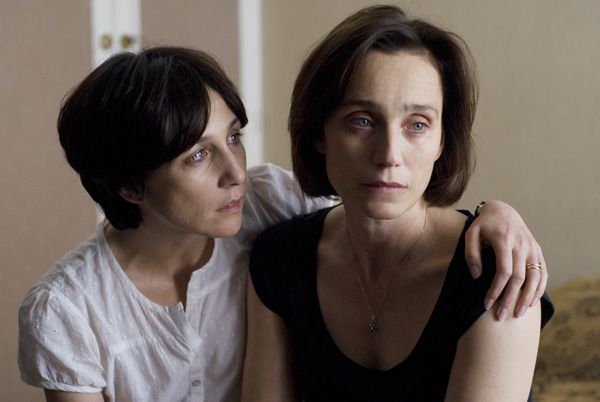I have been bitten by a Frog.
I suppose it's been dormant ever since three days in Paris nearly six years ago, revived briefly by watching Amelie, and by those Berlitz language tapes I still have in my car.
Kristin and I finally watched Kristin Scott Thomas in Philippe Claudel's Il y a longtemps que j'aime, or I've Loved you for So Long, after being tantalized by previews of women with tear-stained faces yelling "pourQUOI" very loudly at each other. We do this sometimes when feeling particularly emotive.
Juliette (Scott Thomas) emerges from fifteen years in prison. Her sister Lea, years younger than Juliette, is thrilled to have her long-absent sister back, but Juliette's bleakness is ghostly in comparison to Lea's shy delight and full life.

It was worth the wait. We sat on the edge of our seats, completely absorbed in the unimportant daily conversations that occur against the backdrop of this significant sometimes unmentioned past, while characters grasp for truth and redemption in the dark.
Sometimes I think this blog is not so much a record of what I'm reading, but a record of the cycles of my obsessions. And now, I have French mania. I find that the French films and books I've been recently exposed to have been quirky, magical, and luminous. That quintessential French combination of existentialism and joie de vivre.
Next on my to-do list is reading Olivier Rolin's Hotel Crystal, the chronicle of a mysterious man's stay in various international hotel rooms. And Eric, a co-worker, has graciously compiled a list of must-see French film. He's into New Wave.
Since I don't know anything about cinema, we've been toying with the idea of starting an unofficial, highly subjective film club. My first proposition is Grey Gardens, the 1975 documentary starring Big and Little Edie Beale, relatives of Jacqueline Kennedy Onassis (on the Bouvier side), in their dilapidated Hampton mansion. Warbling to records, fancy-pants dancing, innumerable head scarves, cats peeing on paintings, and the terrible sad decay of time... Need I say more?

But - it is soon time to go home to mon brie et cafe.
I suppose it's been dormant ever since three days in Paris nearly six years ago, revived briefly by watching Amelie, and by those Berlitz language tapes I still have in my car.
Kristin and I finally watched Kristin Scott Thomas in Philippe Claudel's Il y a longtemps que j'aime, or I've Loved you for So Long, after being tantalized by previews of women with tear-stained faces yelling "pourQUOI" very loudly at each other. We do this sometimes when feeling particularly emotive.
Juliette (Scott Thomas) emerges from fifteen years in prison. Her sister Lea, years younger than Juliette, is thrilled to have her long-absent sister back, but Juliette's bleakness is ghostly in comparison to Lea's shy delight and full life.

It was worth the wait. We sat on the edge of our seats, completely absorbed in the unimportant daily conversations that occur against the backdrop of this significant sometimes unmentioned past, while characters grasp for truth and redemption in the dark.
Sometimes I think this blog is not so much a record of what I'm reading, but a record of the cycles of my obsessions. And now, I have French mania. I find that the French films and books I've been recently exposed to have been quirky, magical, and luminous. That quintessential French combination of existentialism and joie de vivre.
Next on my to-do list is reading Olivier Rolin's Hotel Crystal, the chronicle of a mysterious man's stay in various international hotel rooms. And Eric, a co-worker, has graciously compiled a list of must-see French film. He's into New Wave.
Since I don't know anything about cinema, we've been toying with the idea of starting an unofficial, highly subjective film club. My first proposition is Grey Gardens, the 1975 documentary starring Big and Little Edie Beale, relatives of Jacqueline Kennedy Onassis (on the Bouvier side), in their dilapidated Hampton mansion. Warbling to records, fancy-pants dancing, innumerable head scarves, cats peeing on paintings, and the terrible sad decay of time... Need I say more?

But - it is soon time to go home to mon brie et cafe.
Comments
Up with Grey Gardens, by the way. Also, my wife and I recently watched Luchino Visconti's 'The Leopard' (1963), which is based on Giuseppe di Lampedusa's novel of the same name. The novel is, not surprisingly, much richer, but the film was gorgeously shot.
I'll look out for "The Leopard." I've been meaning to read it - and now I'll have to watch it too.